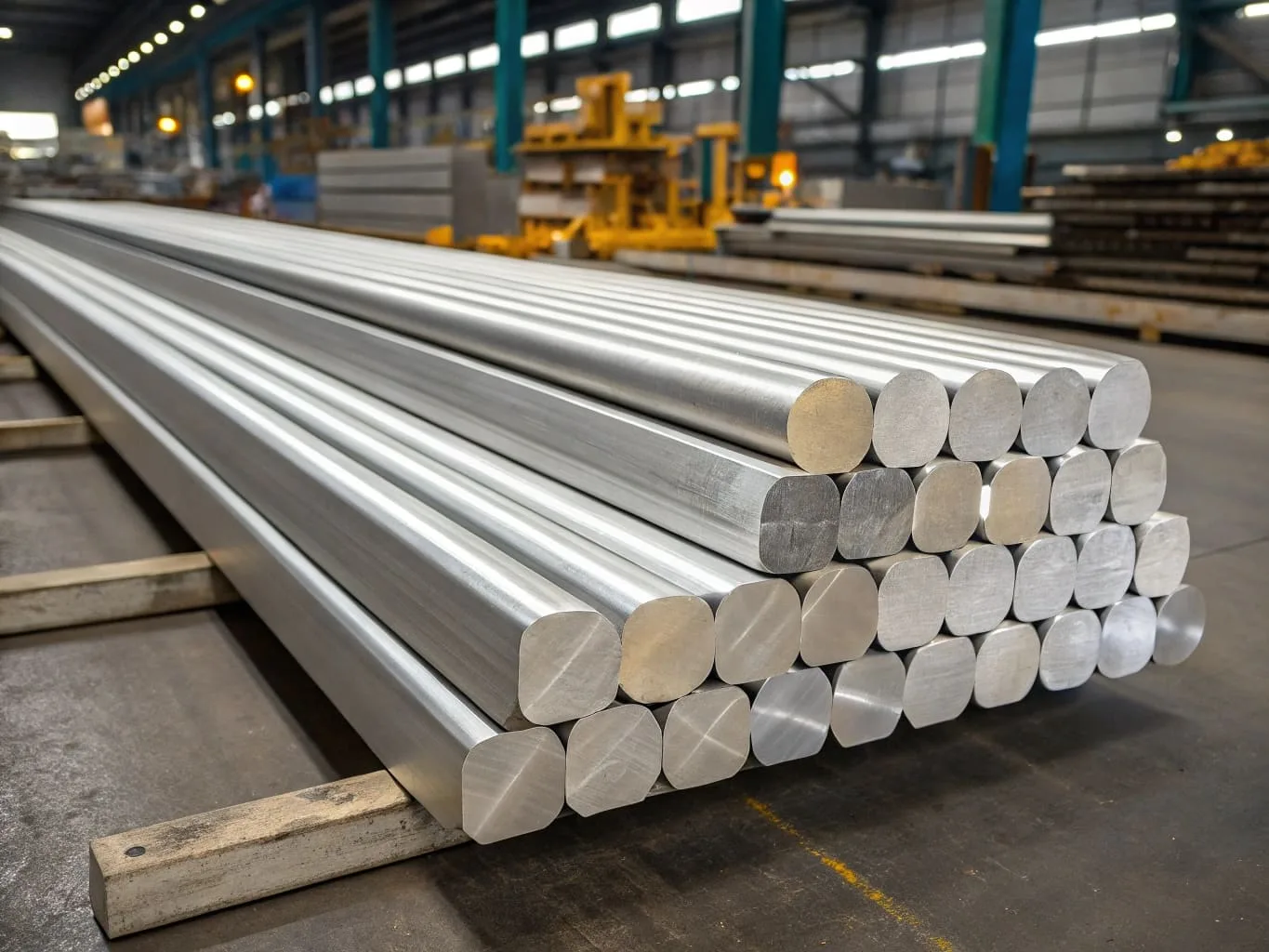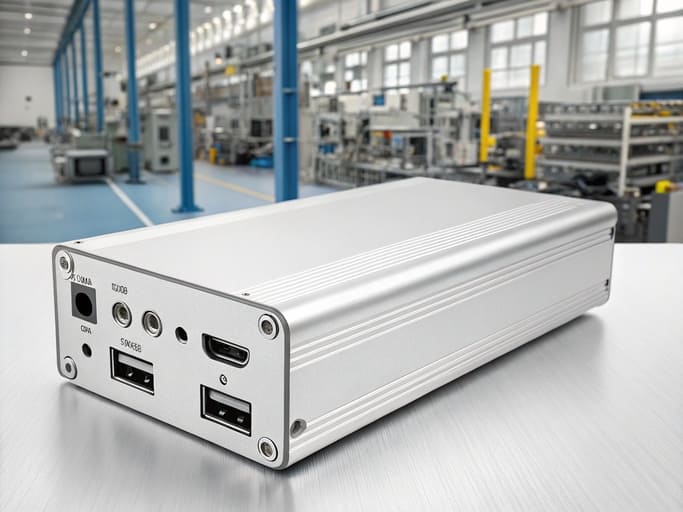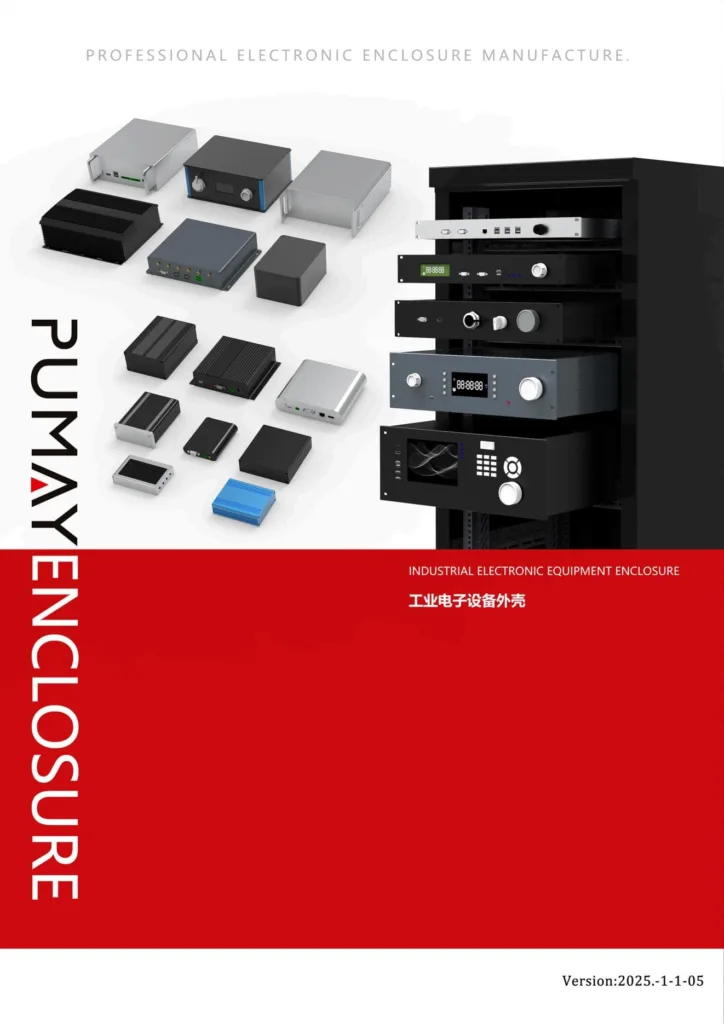Struggling with bulky, inefficient electronic housings? Poor choices here can overheat components and inflate costs. Let's find a better way for your projects.
Aluminum extrusion is favored for electronic enclosures due to its excellent thermal conductivity, EMI shielding, lightweight strength, design flexibility1 for complex shapes, and cost-effectiveness for custom profiles. This makes it ideal for protecting modern electronics.
 caled.webp)"Aluminum Extrusion for Electronics")
caled.webp)"Aluminum Extrusion for Electronics")
Now that we've touched on why it's a great option, let's explore this further. When I first started in an aluminum profile factory, I saw raw metal transformed into incredibly precise shapes. It was fascinating. Later, building my custom enclosure business, PUMAYCASE, I realized how much these extrusions empower engineers like Jeff. They need solutions that are not just protective but also smart and adaptable. "Enclosing Innovation, Delivering Precision" isn't just our slogan; it’s what aluminum extrusion helps us deliver. So, let's get into the details.
What are the advantages of aluminum extrusion?
Are you looking for a versatile manufacturing process? Choosing the wrong method can limit your design and increase production headaches. Aluminum extrusion offers many benefits.
Aluminum extrusion provides design freedom for complex cross-sections, good strength-to-weight ratio, inherent corrosion resistance, excellent thermal conductivity, and cost-effective tooling. These make it highly adaptable for various applications, especially electronics.
 "Advantages of Aluminum Extrusion")
"Advantages of Aluminum Extrusion")
Let's dive deeper into these advantages. I've seen countless projects benefit from these inherent qualities. It’s not just about making a box; it’s about making the right box efficiently.
Design Flexibility and Complex Shapes
One of the biggest wins with aluminum extrusion is the ability to create very complex cross-sectional profiles. You can integrate features like T-slots for mounting components, cooling fins for heat dissipation, and channels for wiring directly into the profile design. This reduces the need for secondary machining operations, saving time and money. I remember a client needing a very specific internal groove for a PCB – extrusion made it simple.
Excellent Strength-to-Weight Ratio
Aluminum is about one-third the density of steel. This makes aluminum extrusions lightweight yet surprisingly strong, especially when using alloys like 6061-T6. This is perfect for portable devices or applications where weight is a concern, without sacrificing durability. Jeff, our typical product engineer, often needs lightweight designs for field instruments, and this is a huge plus.
Natural Corrosion Resistance
Aluminum naturally forms a protective oxide layer on its surface when exposed to air. This layer prevents further oxidation and corrosion. For even better protection, especially in harsh environments, extrusions can be anodized or powder-coated.
Superior Thermal Conductivity
Aluminum is an excellent conductor of heat. This makes extruded aluminum enclosures act as effective heat sinks, drawing heat away from sensitive electronic components. This can often eliminate the need for separate fans or cooling systems, simplifying design and reducing costs.
| Advantage | Benefit for Electronic Enclosures | PUMAYCASE Application Example |
|---|---|---|
| Design Flexibility | Integrated features (cooling fins, mounting slots), unique shapes | Custom profiles with built-in PCB guides |
| Strength-to-Weight | Durable yet light, good for portable or mounted devices | Lightweight handheld instrument cases |
| Corrosion Resistance | Long lifespan, suitable for various environments | Outdoor sensor housings (often with anodizing) |
| Thermal Conductivity | Passive cooling, dissipates heat from components | Enclosures for power supplies or high-power LEDs |
These combined advantages make aluminum extrusion2 a go-to for so many electronic housing needs.
Why is aluminium used for electronics?
Ever wondered why aluminum is so common in electronic devices? Other materials might seem cheaper initially, but they often lack aluminum's unique combination of properties.
Aluminum is widely used for electronics due to its excellent electrical conductivity (for grounding/shielding), superior thermal conductivity3 (for heat dissipation), non-magnetic nature, light weight, strength, and ease of fabrication into custom shapes like enclosures.
 "Aluminum in Electronics")
"Aluminum in Electronics")
Let's dive deeper into these reasons. From my experience, especially when working with engineers on intricate designs, aluminum consistently solves multiple problems at once.
Electrical Properties
- Conductivity and Grounding: Aluminum is a good electrical conductor. This makes it suitable for EMI/RFI shielding, protecting sensitive internal components from external electromagnetic interference, and vice-versa. The enclosure itself can act as a Faraday cage. It's also easily grounded.
- Non-Magnetic: Aluminum is non-magnetic, which is crucial for applications where magnetic interference could disrupt performance, such as in sensitive measuring instruments or audio equipment.
Thermal Management
As mentioned before, aluminum’s high thermal conductivity is a massive advantage. Electronic components generate heat, and managing this heat is vital for reliability and longevity. Aluminum enclosures can act as a passive heat sink. I've seen complex devices where the entire enclosure is designed with fins to maximize heat dissipation, all thanks to extrusion.
Mechanical and Fabrication Advantages
- Lightweight and Strong: Essential for portable electronics or reducing overall system weight.
- Ease of Fabrication: Aluminum can be easily machined, drilled, punched, bent, and welded. Extrusion, in particular, allows for complex shapes to be created in long, continuous pieces, which can then be cut to length. This simplifies the manufacturing of custom enclosures. PUMAYCASE's integrated manufacturing line thrives on aluminum's workability.
Durability and Aesthetics
- Corrosion Resistance: Provides long service life.
- Finishing Options: Aluminum can be anodized in various colors, powder-coated, painted, or given brushed/polished finishes, allowing for aesthetically pleasing and branded products. This is important for customer-facing devices.
| Property | Relevance to Electronics | Example Application |
|---|---|---|
| Electrical Conductivity | EMI/RFI Shielding, Grounding | Shielded enclosures for sensitive measurement equipment |
| Thermal Conductivity | Heat dissipation from CPUs, power transistors, LEDs | Amplifier casings, LED light housings |
| Non-Magnetic | Prevents interference with magnetic sensors or components | Medical imaging equipment components, Hi-Fi audio gear |
| Lightweight | Portability, reduced structural load | Laptops, tablets, drone components |
| Ease of Fabrication | Complex enclosure designs, integrated features | Custom extruded profiles with heatsink fins |
These factors make aluminum a highly versatile and practical choice for a vast range of electronic applications.
Which metal would be a good choice for the extrusion process?
Thinking about extrusion for your parts? Not all metals are created equal when it comes to this forming process. Choosing correctly is key to success.
Aluminum is an excellent choice for the extrusion process. Its favorable characteristics like lower melting point, good malleability, and ability to form complex shapes with good surface finish make it highly suitable and cost-effective.
 "Aluminum for Extrusion Process")
"Aluminum for Extrusion Process")
Let's dive deeper into why aluminum stands out for extrusion. While other metals like copper, magnesium, steel, and titanium can be extruded, aluminum offers a particularly compelling package of benefits for this manufacturing technique.
Aluminum's Extrudability
- Malleability and Ductility: Aluminum alloys, especially in the 6xxx series (like 6063 and 6061 commonly used for enclosures), are very malleable. This means they can be easily pushed through a die to create intricate cross-sections without cracking or requiring excessive force. I've seen dies that produce incredibly complex, thin-walled profiles thanks to this.
- Lower Extrusion Temperatures: Aluminum has a lower melting point and requires lower extrusion temperatures compared to steel or titanium. This translates to less energy consumption, longer die life, and faster production rates. This is a direct cost saving that PUMAYCASE can pass on.
- Surface Finish: Aluminum extrusions typically come out with a smooth, clean surface finish that is often suitable for use as-is or requires minimal preparation for secondary finishes like anodizing or powder coating.
Comparison with Other Metals for Extrusion
| Metal | Extrudability Factors | Common Extrusion Uses | Considerations for Enclosures |
|---|---|---|---|
| Aluminum | Excellent; low temp, complex shapes, good finish | Window frames, heat sinks, structural parts, enclosures | Ideal (light, conductive, strong) |
| Copper | Good; higher temp & pressure than Al | Electrical conductors, plumbing tubes | Heavy, more expensive |
| Magnesium | Fair; requires careful temp control, fire risk | Lightweight structural parts | More reactive, can be brittle |
| Steel | Difficult; very high temps & pressures, rapid die wear | Structural beams, shafts | Very heavy, less design intricacy |
| Titanium | Very Difficult; high temp, special lubricants | Aerospace components, medical implants | Extremely expensive, hard to work |
While other metals have their niches, for creating detailed, lightweight, and cost-effective profiles suitable for electronic enclosures, aluminum is generally the front-runner. The ease with which we can create custom dies for PUMAYCASE projects to meet specific needs like Jeff's, who often needs unique instrument variants, is a testament to aluminum's suitability for extrusion.
What are the advantages of extrusion?
Considering different manufacturing methods? Extrusion offers unique benefits that can streamline your production and enhance your product design, especially for linear parts.
The advantages of extrusion include the ability to create complex cross-sectional shapes, good surface finish, improved material strength from work hardening, and cost-effectiveness for medium to high production volumes of continuous profiles.
 "Advantages of Extrusion Process")
"Advantages of Extrusion Process")
Let's dive deeper into why extrusion is such a powerful manufacturing process. As someone whose business, PUMAYCASE, relies heavily on aluminum extrusions for enclosures, I see these advantages play out every day.
Design Freedom for Complex Cross-Sections
This is perhaps the most significant advantage. Extrusion allows for intricate shapes, including hollows and multiple internal voids, to be produced in a single pass. You can design features like screw bosses, snap-fits, heat sink fins, and channels directly into the profile. This minimizes the need for subsequent assembly or machining operations. For engineers like Jeff who need to integrate many modules into compact enclosures, this is a huge benefit.
Material Properties and Finish
- Good Surface Finish: Extruded parts typically have a smooth surface that is often acceptable as-is or requires minimal preparation for painting, anodizing, or other finishes.
- Work Hardening: The extrusion process can impart some work hardening to the material, improving its strength and structural integrity, particularly for certain aluminum alloys.
Cost-Effectiveness
- Tooling Costs: Die costs for extrusion are relatively low compared to other molding or casting processes, especially for simpler profiles. This makes it economical for even moderate production runs.
- Reduced Machining: By incorporating features into the extruded profile, you reduce or eliminate secondary machining steps, saving time and labor costs.
- Material Utilization: Extrusion is an efficient process with relatively little material waste compared to subtractive manufacturing methods.
Consistency and Production Efficiency
Once the die is made and the process parameters are set, extrusion can produce consistent, identical profiles in long lengths very efficiently. This is ideal for products requiring uniform linear components. Our ability at PUMAYCASE to offer standard extrusions combined with modular end plates cuts development time by up to 40% for our clients.
| Advantage | Description | Implication for Electronic Enclosures |
|---|---|---|
| Complex Cross-Sections | Intricate profiles, internal voids, integrated features made in one step. | Built-in heat sinks, PCB slots, mounting features. |
| Good Surface Finish | Smooth surface directly from the die. | Reduces need for post-processing before anodizing. |
| Material Strength | Work hardening can improve mechanical properties. | More robust and durable enclosures. |
| Cost-Effectiveness (Tooling) | Lower die costs compared to casting/molding. | Economical for custom designs, even smaller batches. |
| Reduced Secondary Ops | Features integrated into profile mean less machining. | Faster production, lower labor costs. |
These benefits make extrusion a very attractive option for many parts, and it's particularly well-suited for creating the main bodies of electronic enclosures.
Why is extrusion better than casting for electronic enclosures?
Choosing between extrusion and casting for your enclosures? Each has its place, but for many electronic housings, extrusion offers distinct advantages affecting design and cost.
Extrusion is often better than casting for electronic enclosures because it allows for long, continuous profiles with complex cross-sections, offers better surface finish, tighter tolerances, and generally lower tooling costs for linear designs.
 "Extrusion vs. Casting")
"Extrusion vs. Casting")
Let's dive deeper into this comparison, specifically for electronic enclosures. I've worked with both processes, and for the kind of precision and customization PUMAYCASE clients need, extrusion frequently comes out on top.
Design and Geometry
- Extrusion: Excels at creating parts with a consistent cross-section along their length. Ideal for the main body of an enclosure, where you might need features like heat sink fins or PCB slots running the entire length. Can produce very intricate profiles.
- Casting (e.g., Die Casting): Better for creating complex 3D shapes with varying wall thicknesses, bosses, and ribs in multiple directions. Good for end caps, brackets, or more sculptural enclosure designs. However, achieving long, thin-walled profiles with tight internal features can be challenging and costly.
Tolerances and Surface Finish
- Extrusion: Generally offers tighter dimensional tolerances and a smoother surface finish directly from the die. This means less post-processing and better fit-up for components. For PUMAYCASE, "Delivering Precision" is key, and extrusion helps achieve this.
- Casting: Can have issues like porosity, draft angles (needed to remove parts from molds), and a rougher surface finish that may require more machining or surface treatment. Tolerances are typically looser than extrusions.
Tooling and Production Costs
- Extrusion: Dies are relatively less expensive and quicker to produce, especially for simpler profiles. Very cost-effective for producing long lengths of a consistent profile.
- Casting: Molds for die casting are complex and expensive, making it more suitable for very high production volumes where the tooling cost can be amortized over many parts. Setup times can also be longer.
Material Properties
- Extrusion: The process can result in a wrought material structure with good strength and integrity.
- Casting: Cast parts can sometimes have internal porosity if not carefully controlled, which might affect strength or sealing (like IP ratings).
Here's a quick comparison for enclosure applications:
| Feature | Aluminum Extrusion | Die Casting (Aluminum) | Typical Enclosure Use Case Favoring Method |
|---|---|---|---|
| Shape Complexity | Complex 2D profiles, continuous length | Complex 3D shapes, varying wall thickness | Extrusion for main bodies, linear elements |
| Surface Finish | Smoother, cleaner | Can be rougher, parting lines visible | Extrusion when high-quality finish needed |
| Dimensional Tolerance | Tighter | Generally looser | Extrusion for precision fits |
| Tooling Cost | Lower | Higher | Extrusion for low-to-mid volumes, custom |
| Ideal Part Type | Enclosure bodies, heat sinks, rails, frames | End caps, complex shaped small housings, brackets | Combined (e.g., extruded body + cast end caps) |
| Strength | Good, wrought structure | Can be strong, but watch for porosity | Extrusion for consistent structural parts |
For many electronic enclosures, especially those with a consistent profile like many of the instrument cases Jeff, our product engineer, works on, extrusion is the more efficient and precise method for the main housing. Casting might be used for complementary parts like end plates if they have very complex 3D features.
What are the pros and cons of aluminum?
Considering aluminum for your project? It has many great qualities, but like any material, it's not perfect for every situation. Understanding both sides is crucial.
Aluminum's pros include being lightweight, strong, corrosion-resistant, highly conductive (thermal/electrical), recyclable, and easily machinable/extrudable. Cons can include lower strength than steel, higher cost than steel, and susceptibility to certain types of corrosion if unprotected.
 "Pros and Cons of Aluminum")
"Pros and Cons of Aluminum")
Let's dive deeper into these pros and cons, particularly from the perspective of using aluminum for electronic enclosures. My journey with PUMAYCASE has shown me how these characteristics directly impact design and performance.
Pros of Aluminum:
- Lightweight: About one-third the density of steel. This is a significant advantage for portable electronics, reducing shipping costs, and easing installation.
- Good Strength-to-Weight Ratio: Alloys like 6061-T6 offer excellent strength, making enclosures durable without being overly heavy. This helps engineers like Jeff balance IP67 sealing with lightweight design needs.
- Corrosion Resistance: Forms a natural protective oxide layer. This can be further enhanced by anodizing or painting, making it suitable for various environments.
- Excellent Thermal Conductivity: Ideal for heat dissipation from electronic components, often allowing the enclosure itself to act as a heat sink.
- Excellent Electrical Conductivity: Useful for EMI/RFI shielding and grounding.
- Non-Magnetic: Important for applications sensitive to magnetic fields.
- Ease of Machining and Forming: Aluminum is readily machined, extruded, cast, and formed, allowing for complex designs and efficient manufacturing. Our 4,500 m² integrated manufacturing line at PUMAYCASE processes aluminum daily.
- Recyclability: Aluminum is 100% recyclable without loss of quality, making it an environmentally friendly choice.
Cons of Aluminum:
- Lower Strength than Steel: While strong for its weight, it's not as strong as steel in absolute terms. For extremely high-impact or high-load applications, steel might be preferred, but this is rarely the case for standard electronic enclosures.
- Higher Cost than Steel (by weight/volume): Raw aluminum typically costs more than common steel grades. However, its lower density means you use less material by weight for the same volume. Also, ease of processing and the ability to extrude complex shapes can offset initial material costs.
- Susceptibility to Galvanic Corrosion: When in contact with dissimilar metals (like stainless steel fasteners) in a corrosive environment, aluminum can corrode preferentially if not properly isolated or treated.
- Lower Fatigue Strength than Steel: For applications with very high cyclic loading, this might be a consideration, though less common for typical enclosures.
- Conductivity can be a con: While good for shielding, if you need electrical isolation, additional design steps (coatings, insulators) are needed.
Here's a summary table for enclosure considerations:
| Aspect | Pros for Enclosures | Cons for Enclosures |
|---|---|---|
| Weight | Lightweight for portability & mounting | - |
| Strength | Good strength-to-weight ratio for protection | Not as strong as steel for extreme physical abuse |
| Corrosion | Naturally resistant, easily enhanced (anodizing) | Galvanic corrosion risk if improperly paired with other metals |
| Thermal | Excellent heat dissipation | - |
| Electrical | Good for EMI shielding, grounding | Needs insulation if electrical isolation is required |
| Cost | Extrusion can be cost-effective | Raw material can be pricier than steel |
| Fabrication | Easy to machine, extrude, form complex shapes | - |
For most electronic enclosures, the pros of aluminum significantly outweigh the cons, making it the material of choice for PUMAYCASE and many engineers.
Conclusion
Aluminum extrusion offers unmatched design flexibility, thermal performance, and strength-to-weight benefits, making it the premier choice for modern electronic enclosures. It truly empowers innovation.
Learn how design flexibility in aluminum extrusion can lead to innovative and efficient electronic housing solutions. ↩
Explore the advantages of aluminum extrusion, including thermal conductivity and design flexibility, to enhance your electronic projects. ↩
Understanding aluminum's thermal conductivity can help you design better cooling solutions for your electronics. ↩





